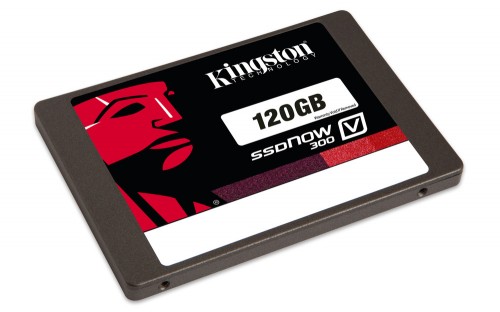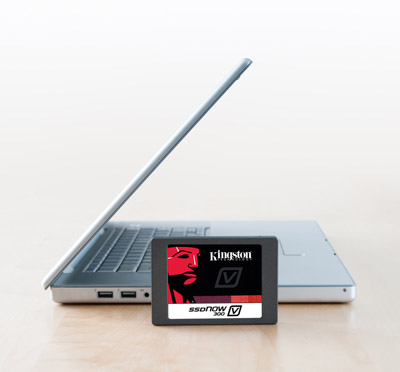- Qualcomm Launches Snapdragon 4 Gen 2 Mobile Platform
- AMD Launches Ryzen PRO 7000 Series Mobile & Desktop Platform
- Intel Launches Sleek Single-Slot Arc Pro A60 Workstation Graphics Card
- NVIDIA Announces Latest Ada Lovelace Additions: GeForce RTX 4060 Ti & RTX 4060
- Maxon Redshift With AMD Radeon GPU Rendering Support Now Available
Kingston SSDNow V300 120GB SSD Review

Looking for an affordable SSD but demand a high-performance controller? Kingston’s SSDNow V300 is shaping up to be just that. Powered by a SandForce SF-2281 controller and paired with Toshiba’s 19nm Toggle-based NAND, it’s an aggressive entrant for its price-point. Let’s check it out.
Page 10 – Final Thoughts
As with any value-oriented product, the largest issue comes down to price. At the time of this writing, the bare 120GB drive can be had for $101 from a of couple retailers, with the various kits adding another $10-15 onto that. This gives it the distinction of not only being the lowest-cost SF-2281-powered SSD around, but for the present time also the highest performing SSD at its price-point. Cheaper options either use a cut-down budget Marvell controller with lower performance, or use TLC NAND which suffers from both lower write performance and lower NAND endurance. As always, prices change daily, but Kingston has priced the V300 aggressively against its direct competition and other well-regarded brands.
It wasn’t that long ago that SF-2281 powered SSDs could only be found in flagship and mid-range drives that fetched a price premium, yet today it is one of the most widely used controllers still on the market with even Intel still releasing new consumer drives based upon the controller. With the SSDNow V300 family, Kingston is introducing a high-performance controller it is already familiar with and packaging it with leading 19nm process NAND to deliver a low-cost budget SSD. At its given pricing, the V300 is competing directly against several SSDs that are utilizing the first generation SandForce controller (SF-1200) as well as several partially cut-down Marvell controllers – neither of which would come close to the V300’s performance.

That said, there are a few points to mention regarding SandForce controllers. They rely on data compression to achieve best performance, so things like compressed files, Jpegs, MP3s, or some videos won’t benefit well, but then again, not many consumers buy SSDs to clutter them up with those kinds of files. They also rely on over-provisioning in order to maintain drive performance, which has the most notable impact in that SF-2281 drives are sold at 60/120/240GB capacities instead of 64/128/256GB – the user loses a few gigabytes of capacity that other controllers don’t hog.
Lastly, even though LSI bought up SandForce and several years have been devoted into firmware updates and controller revisions, there is simply no denying that SandForce is still stuck with the old stigma about device stability that it originally created for itself. Given the wide diversity of controllers and system configurations that exist, there’s a slim chance the occasional consumer may run into a problem however unlikely that may be. Even so, we have no qualms recommending SF-2281 based drives and I personally have been using a pair of them for some time in my own desktop. I have not experienced any issues a firmware update and changing the port to a native Intel controller did not resolve.

Kingston’s SSDNow V300 series delivers mid-range solid-state drive performance at budget solid-state drive prices. When in the market for a budget-friendly SSD, we would definitely recommend the V300 as long as it maintains its aggressive price positioning. For example, at the moment the Kingston flagship HyperX 3K 240GB slots in cheaper than the 240GB V300 on Newegg, so there isn’t any reason to not just upgrade to a HyperX 3K – but that just goes to show prices are everything in the budget SSD market and that it pays to look around.
Given Kingston’s extensive history in the SSD market and its aggressive prices yet strong mid-range performance, the V300 should certainly be at the top of your SSD list when searching for a new affordable SSD.
Support our efforts! With ad revenue at an all-time low for written websites, we're relying more than ever on reader support to help us continue putting so much effort into this type of content. You can support us by becoming a Patron, or by using our Amazon shopping affiliate links listed through our articles. Thanks for your support!




